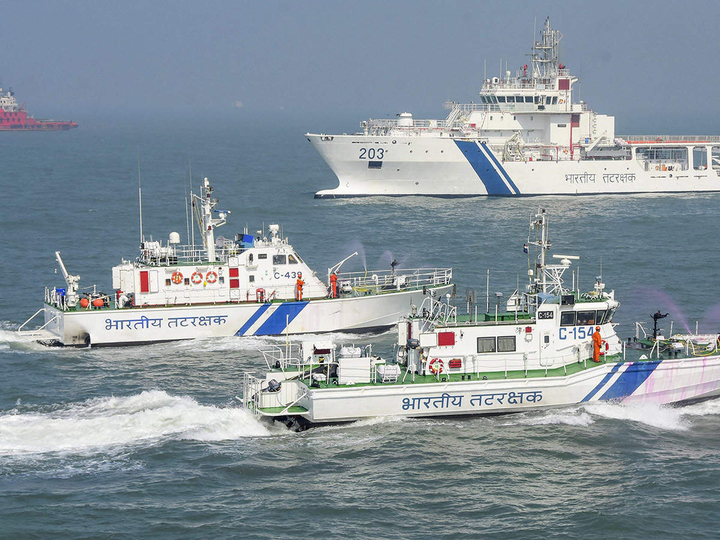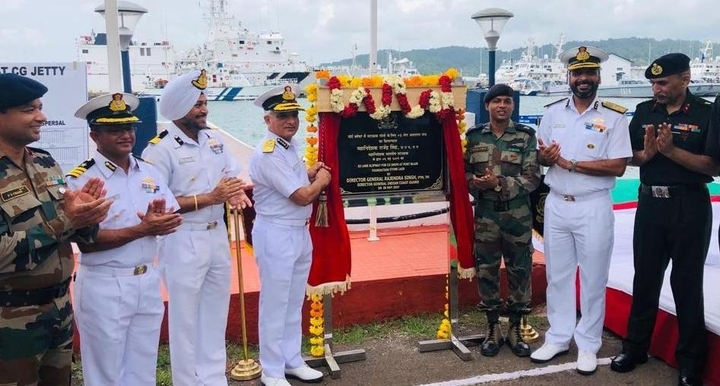- Home/
- NDA/
- Indian Coast Guard Exam/
- Article
Major Difference between Indian Navy and Indian Coast Guard, Check Here!
By BYJU'S Exam Prep
Updated on: September 11th, 2023

Indian Navy vs Indian Coast Guard – The Indian navy and coast guard are both government-run institutions. Both have distinct duties and approaches to defending the country. Their working styles are similar, but there are significant distinctions. The one concentrates more on military training and frequent exercises to respond to a crisis, while the other has diverse responsibilities such as regular patrolling and surveillance to protect the nation in peacetime.
Table of content
During peacetime, the Indian Coast Guard and the Indian Navy are two completely different organizations with nearly identical charters of duties (work and service conditions). According to a recent government Gazette, the Coast Guard occupies a unique position. It is not classified as either an Indian military force (such as the Indian army, navy, or air force) or a paramilitary force. Since the coast guard made a concerted effort to merge with the Indian military, their laws and regulations have become a hybrid of the two.
First, let us know the differences and similarities between the Indian Navy and Indian Coast Guard.

Image Source: The economic times
Differences between Indian Navy and Indian Coast Guard
The following are the differences between the Indian Navy and the Indian Coast Guard
- The officers of the ICG are Class A Gazetted officers, not commissioned officers.
- After they retire, they do not receive Ex-Servicemen status.
- Rank names are similar to paramilitary forces, however, they have full hierarchy from their force, unlike paramilitary forces (where above DIG rank is from IPS cadre) (earlier naval forces were also there because of lack of seniority of the officer of ICG).
- Only the Army, Navy, and Airforce are included in India’s Defense Budget. It does not include the ICG budget. The ICG is funded by the Ministry of Defense’s Civil Estimates.
- ICG does not have MSP (Military Service Pay).
- Unlike the Navy, which has a conventional pension system, the ICG has an NPS pension scheme.
- Unlike ICG ships, which only have light guns, Indian naval ships have bigger and superior armament systems (missiles, heavy guns, modern radar systems, etc.).

Similarities between Indian Navy and Indian Coast Guard
- The uniform is identical to that of the Indian Navy.
- Indian Navy equivalents are used for training. At INA, for officers, and at Chilka, for sailors.
- All allowances and deductions for equivalent service conditions (divers, seagoing allowance, hard area allowance, HRA, etc.) are the same as in the Indian Navy.
- Service conditions and rules and regulations for personnel are the same in both cases, i.e. rules for promotions and rules for postings. Punishment rules are a set of regulations that govern how people are punished.
- In both, there is a canteen and a medical facility. ICG personnel is permitted to use, and do so, the military hospitals of the Indian Navy, Army, and Air Force. Indian Naval Medical Officers serve on ICG ships.
Now, here are the easily distinguishable aims of the Indian Navy and Indian Coast Guard
|
Indian Navy |
Indian Coast Guard |
|
|
Differences between the Service Conditions of Indian Navy and Indian Coast Guard
Differences in the Indian Navy and the Indian Coast Guard service conditions, particularly the lack of a common or similar rank structure and different promotional criteria, have the most potential to pose problems in any future collaboration between the Indian Navy and the Indian Coast Guard.
- Officers are inducted into the Indian Navy through the National Defence Academy and the Naval Academy, as well as through direct entry into technical branches.
- The Indian Coast Guard officers are likewise entered through the Naval Academy, but unlike the Naval officers, the Indian Coast Guard officers join as Assistant Commandants rather than cadets.
- This discrepancy might be explained by the fact that Indian Coast Guard officers are typically older than their naval counterparts at the time of induction.
- As a result, by the time a navy officer completes his Midshipman’s training and is commissioned, his ICG coursemate is already an Assistant Commandant with one and a half years of experience.
- When an Indian Coast Guard officer comes up for a watch-keeping ticket later, the naval officers who have already received the ticket are still his juniors.
- Previously, Indian Coast Guard officers were given their tickets by naval officers who were technically junior to them based only on years of service.
- An Indian Coast Guard officer might also become a Commandant in eight years if he received his promotion at the correct moment.
- A considerably more senior naval officer would not have been considered for promotion to Commander by this time.
- The Commandant was equated to the Commander in the absence of clear directives and a similar rank system, which caused major complications.
An instance of the above problem occurred in Palk Bay during joint operations.
- The Commanding Officer (CO) of the Indian Navy (IN) ship, a Lieutenant Commander, was assigned the Officer in Tactical Command during an escort operation involving an IN and a CG (Coast Guard) ship simultaneously escorting a merchant ship repatriating Sri Lankan refugees (OTC).
- The CO of the CG ship, who was a Deputy Commandant with approximately three and a half years less commissioned service than his naval counterpart, objected, alleging that he was senior because he became a Deputy Commandant before the naval officer became a Lieutenant Commander.
- To minimize embarrassment and sidestep the issue, an even more senior naval officer was designated OTC, and the shore authority in charge of the operations sent a signal to higher-ups inquiring about the relative seniority of the COs but did not obtain a definitive response.
Common service conditions for the two services, as well as a common or equal rank structure for officers, are seen as essential for removing mutual irritants and improving cooperation. The Indian Coast Guard, as the Union’s fourth Armed Force, must be accorded the same advantages as the other defense forces. Entry criteria and qualifications for the Coast Guard should be identical to those for the Navy. The promotion standards must also be aligned. A large number of the officers serving the Coast Guard should be naval deputationists, to maintain the force’s naval identity.
The Coast Guard officers should be assigned to naval ships and groups in the same way that they are in the United States. Not only would this promote mutual understanding, but it will also familiarize the police with one another’s operational processes.
The Indian Coast Guard has already released the notification for the recruitment of Assistant Commandant 1/23. As the Stage I exam is scheduled for the last week of March 2022, there is not so much time left for the exam. You can check our Online Classroom program that will enhance your preparation and will boost your chances of getting selected also, and you can check our Defence Mock Test series that will help you to test your preparation.
Thanks
Download the BYJU’S Exam Prep App Now
The Most Comprehensive Exam Prep App
#DreamStriveSucceed
